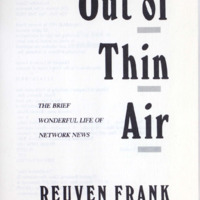-
Description
-
Reuven Franks account of the development of television news.
-
Identifier
-
372181
-
671677586
-
Creator
-
Frank, Reuven
-
Source
-
Brian Lamb Booknotes Collection
-
Gift of Brian Lamb, 2011.
-
Language
-
eng
-
Date
-
1991
-
Program air date: September 15, 1991,
-
Publisher
-
Simon & Schuster
-
George Mason University. Libraries. Special Collections & Archives
-
Subject
-
"NBC News--History."
-
"Television broadcasting of news--United States."
-
Journalists--United States--Biography
-
Journalism--Social aspects--United States
-
Press and politics--United States
-
Relation
-
Original Booknotes interview
-
Rights
-
This work may be protected by copyright laws and is provided for educational and research purposes only. Any infringing use may be subject to disciplinary action and/or civil or criminal liability as provided by law. If you believe that you are the rights-holder and object to Mason’s use of this image, please contact speccoll@gmu.edu.
-
Text
-
Transcription of Annotations
List on front fly sheet: 1. Influence of newspaper critics; 2. Walters-million dollars ABC; 3. Kissinger/G. Ford; 4. Kalb--guaranteed appearances; 5. When did TV news begin--Convention/Life Mag.; 6. What do you think of the Murrow legend; 7. No smoking sign and Camels; 8. Known by how eve covered the Vietnam War; 9. Hewitt-1964 Convention-stole book from Scotty Connal; 10. The Tunnel-192; 11. Jack Gould-critics pg 78; 12. Robert Kintner. TV news began with 1948 political conventions. Networks claim 10 million Americans had seen part of the coverage, but not possible. Monday, June 21 Republican convention opened. First live broadcast from Senate Office Building, first from campaign headquarters. At convention first live broadcast press conference. NBC TV broadcast logs like baby book. Dewey moment seen on NBC. Politicians wondered why TV was at convention. Murrow rounds Heiskell for betraying integrity of news, staging an event, threatening future of this new/promising medium. Networks could not stop covering now meaningless conventions. Pictures=point of TV reporting. Audience can see things happening, newspapers, magazines, radio cannot. More and more TV news judged by words rather than pictures. Never show a no smoking sign or live camel. On Today--news coverage would show headlines of newspapers around the country--principal "communicator" seen on phone talking to foreign news bureau. Jack Gould influenced bosses, not profound, honest, tried. His ridiculous influence not his fault, judgments old-maidish, writing tortured, tastes unsophisticated. The Tunnel, Sept. 14, 1962. McAndrew says that Kinter worried that RCA might lose its defense business. Kitner was postponing broadcast of "The Tunnel" Used Freedom of Information Act to gain State Department documents about the incident. 1968 Roger Wilkins turned down Frank's position that the country would suffer if newspeople set out to change society. As news division president did different things, known by how covered the war. Averell Harriman. A lot in what Agnew said. FCC chairman asked for transcripts of summary/analysis that followed president's speech. White House preoccupation with TV became total. Two decades after fall of Saigon, Vietnam reporters still important at NBC where reporting corps ad shrunk--presentation over content--panicked search for larger audience regardless of cost. Tuckner. 1973 returned to trade. 60 Minutes shielded from competition. 1976 covering conventions became pointless, networks could not stop. Tom Snyder, tall, large, burly, booming voice, glistening eyes, gladiator-like interviewer. Quick-witted, shallow, bright, glib, intellectually lazy, loud in contempt for conventional journalism. Successful entertainment people try moving to news as a cleansing. Silverman moved include of smoke and panic, flabby, not as short as he seemed. Frank notes "Tom Snyder and I are not in the same business." Dr. Deming, prophet without honor in his own country is a classic story always worth telling. Marvin Kalb hired from CBS, more money, guaranteed appearances on NBC Nightly News. 1983 Connie Chung., would not match $700,00 salary. Anchormen did not make history, presence of camera did. Encounter with Bush about Iran-Contra affair may have changed Bush's wimpy image and garnered nomination/election. Anchorman seen only when speaking. News bureaus closed as anchormen's salaries rose; cameramen laid off while stage settings became more elaborate and graphics devices more complicated/expensive. End of network news--suddenly cheap equipment , eased of satellite transmissions, feisty independent stations, cable TV--CNN.
 372181.pdf
372181.pdf